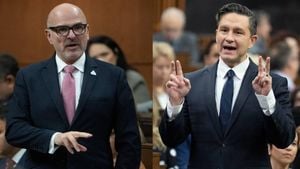The air is thick with anticipation as leaders and representatives from around the globe gather for the 29th Conference of the Parties on Climate Change, commonly referred to as COP29, held this year in Baku, Azerbaijan. With the future of our planet hanging precariously, this year's summit focuses heavily on climate finance, addressing the urgent need for funding to assist developing nations grappling with the ravages of climate change.
World leaders, including Ghana's President Nana Addo Dankwa Akufo-Addo, have convened to assess the progress made since the Paris Agreement and negotiate new commitments to counter the impacts of climate change. The stakes could not be higher. Discussions surrounding financial support have taken center stage, particularly around the New Collective Quantified Goal (NCQG), which is intended to replace the previous commitment of $100 billion annually by developed countries to assist developing nations.
Recent remarks from leaders like Michai Robertson, the lead negotiator for the Alliance of Small Island States, expressed deep frustration with the current state of these negotiations. During informal conversations at COP29, Robertson mentioned, “We do feel abandoned,” highlighting the discontent among nations significantly impacted by climate change. His comments reflect growing concerns among smaller nations as developed countries hesitate to expand their commitments to include necessary funding to address ‘loss and damage’ incurred from climate disasters.
The 'loss and damage' financing mechanism has emerged as one of the key discussions at COP29. Established during last year’s conference, this fund was envisaged to provide support to vulnerable nations experiencing irreversible harm due to climate impacts. So far, pledges to this fund have yielded approximately $700 million, which many—like UN Secretary-General António Guterres—have labeled woefully inadequate when considering the trillions needed to address global climate change.
Adequate climate financing isn’t merely about checks being written; it’s about delivering funds swiftly to nations desperately seeking assistance. Many developing countries report sluggish processes with existing financing frameworks like the Green Climate Fund, where project approval can take years, leaving communities at the mercy of climate impacts.
Turning to the growing calls for responsibility from established nations, leaders from nations like Australia and Qatar have both voiced the urgent necessity for more proactive commitments. Australia's Minister for Climate Change and Energy, Chris Bowen, noted, “Australia contributed $50 million to the Loss and Damage Fund,” underscoring his country’s role but also hinting at the need for broader action globally.
Meanwhile, the leaders of nations such as Zambia and Madagascar lamented how climate change threatens their survival, emphasizing their respective experiences with droughts and extreme weather events. Zambia's environment minister spoke to the disastrous impacts these conditions are having on their agriculture, infrastructure, and overall societal stability.
Ministers from Tunisia, Qatar, and South Korea echoed similar themes, emphasizing the importance of collaborative efforts to finance climate adaptation and mitigation strategies, with many stressing the principle of equitable responsibility among nations based on economic capabilities and historical emissions.
Calls for fairness were also emphasized by environmental activists and organizations outside the conference halls. Activists have suggested imposing taxes on major oil companies, arguing it’s time for polluters to bear the financial brunt of climate disasters. Reports, including one from Greenpeace and Stamp Out Poverty, highlight how these companies, like ExxonMobil and Shell, are raking in significant profits, often leaving the world’s most vulnerable populations to deal with the consequences.
Back within the negotiation rooms, the atmosphere was tense. Discussions around the NCQG struggle to strike a balance between reducing greenhouse gas emissions and providing the necessary mitigation funding required by developing countries. Global leaders are feeling the pressure from their constituents, who are demanding swift action and highlighting societal inequities exacerbated by climate impacts.
Among the wealthier nations, the weight of the conversation shifts toward accountability. Reports indicate only around $10 million of the pledged funds have been delivered, raising serious questions about the commitments made by wealthier nations to follow through on promises made under international agreements.
David Hillman, director of Stamp Out Poverty, articulated the need for what he calls “climate justice,” which holds fossil fuel companies accountable for the jeopardy they add to communities around the world. “A climate damages tax will make polluters pay for the cost of climate impacts,” he expressed during discussions surrounding COP29.
There’s increasing recognition of the interconnectedness of global finance and climate resilience. Many advocates are calling for drastic overhauls of financial systems, emphasizing the need for funds directed not merely at recovery efforts but, more urgently, at preventative measures to mitigate future disasters.
During COP29, the negotiation reflect two diverging paths: one emphasizing immediate accountability and the other favoring long-term solutions to climate resilience. With the conference still underway, leaders are being urged not to leave Baku without solid outcomes, especially concerning the NCQG and the capitalization of the Loss and Damage Fund.
Political will appears to vary significantly across regions. For island nations facing existential threats from rising sea levels, every moment lost to inconclusive negotiations is another moment closer to disaster. Leaders have firmly stated the need for urgent, tangible, and effective outcomes to protect their communities.
It remains to be seen if COP29 will bridge the gap between the ambitious pledges made and the actual disbursements required to meet the overwhelming challenges posed by climate change. With participation from diverse nations, the call for responsibility and action echoes across the continent, binding leaders to their promises and the people they serve.
Will COP29 deliver the action and accountability many are demanding, or will the talks dissolve as mere words once again? The coming days will reveal the answer, as hours of negotiation continue under the pressure of climbing temperatures and rising seas.



